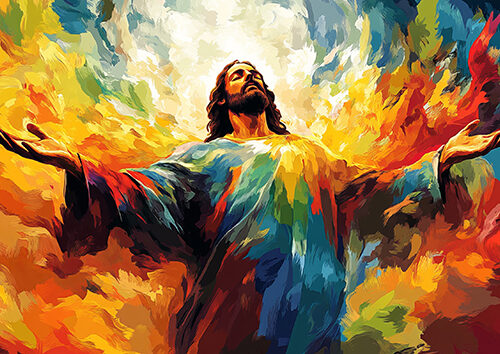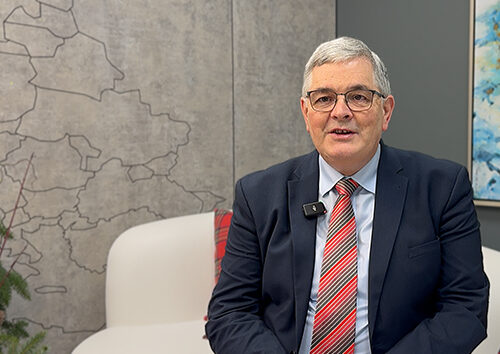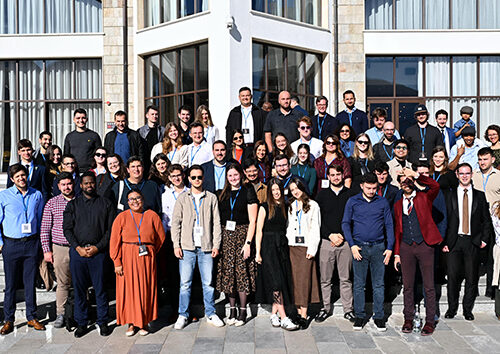Presented by Chris Oberg
24 August 2012, Rogaška Slatina, Slovenia [John Surridge, tedNEWS] Pastor Chris Oberg was the first female speaker at the EPC’s plenary sessions. Despite her surname she is an American, though as she hastily pointed out, she feels very at home in Europe. “One day, if North America gets tired of me, I’m coming to you!” she said.
Pastor Oberg came to address the EPC as a fellow pastor. “It doesn’t matter how big or small your congregation is,” she said, “because all of our church members have the same needs.” She continued that perhaps, one day, she should write a book called “The Good, the Bad and the Ugly”. Drawing on a few of her more unusual experiences in ministry she spoke of the good days, when people come to her requesting baptism; bad days when members come with a long list of criticisms; and weird days – like when a woman came to her with a vision from the Holy Spirit, and delivered the church from an evil spirit! Relating the story to her husband she said, “I’ve just met a woman I don’t know, who cured us of an evil spirit I didn’t know we had!”
Affirmative mumblings from the audience suggested that many such strange experiences could be gleaned from the fields of the Trans-European Division.
Speaking of fields, Pastor Oberg’s address was based on Matthew 13:24-30, where Jesus tells the parable of the wheat and the planted weeds. The story is familiar to all but it soon became clear that Pastor Oberg was not going to be content with a straight exposition of the text. This was certainly included but the overriding message she had to give was actually about the way we interpret the scriptures.
“Interpretations of Jesus words can become fratricidal weapons,” she said. For example, think about the things we say Jesus doesn’t like: Children who run in the sanctuary, teenagers with spiky hair, youth with tattoos, those who have pre-marital sex, those who are attracted to people of the same gender…
 Referring back to the text in Matthew, Pastor Oberg outlined a brief history of its interpretation: the almost allegorical words of Matthew which immediately follow Jesus’ own words; the preferences of the Donatists and Augustinians; the harsh and even harsher words of the Reformers, some of which led to burnings at the stake! “It is not Jesus,” said Pastor Oberg, “it is interpretations on Jesus that seem to do the damage.”
Referring back to the text in Matthew, Pastor Oberg outlined a brief history of its interpretation: the almost allegorical words of Matthew which immediately follow Jesus’ own words; the preferences of the Donatists and Augustinians; the harsh and even harsher words of the Reformers, some of which led to burnings at the stake! “It is not Jesus,” said Pastor Oberg, “it is interpretations on Jesus that seem to do the damage.”
In a humorous aside she related an account of the time when she was studying the text using an online research tool. As she was reading the words about the weeds being burned up, the sophisticated, context sensitive, advertising engine flashed up an advert at the side of the screen: for weedkiller!
“The parable clearly says leave the weeds alone,” she said. “Good people belong to God, bad people belong to the devil.” We overcomplicate it when we add our own interpretation.
As an illustration of just how we can manipulate texts through our own interpretation, Pastor Oberg presented a two and a half minute video of how the text could possibly be seen. With dark, stormy images, and a heavy, minor-key soundtrack, the satanic weeds were pictured infiltrating the otherwise healthy field. The concluding words: “Harvest Time is Coming!”
 “In the context of 2012,” said Pastor Oberg, “we must ask, what does this message sound like to the world today?” The issue is not just one of biblical interpretation; it’s about the picture of God that we present to the world.
“In the context of 2012,” said Pastor Oberg, “we must ask, what does this message sound like to the world today?” The issue is not just one of biblical interpretation; it’s about the picture of God that we present to the world.
Graphically illustrating our damaged and fractured world, through images of violence, protests and riots, Pastor Oberg pointed out that many of these events were driven by religious conviction and ideology. “It’s not Jesus’ words that are doing this,” she said, “it’s people’s interpretations, and interpretations of those interpretations.”
In the United States some 20% of people who call themselves Christians don’t live inside the Christian community. The question we need to ask is, “Do people walk away because of OUR interpretations?”
With an illustration from her own life Pastor Oberg told of an occasion when she had returned home, carrying the frustrations and burdens of a hard day at the office. After a while she realized that her teenage daughter had disappeared. Why? “It’s easier for me to be somewhere else while you work it out,” she had said.
So it is for the world. While we are trying to sort out what Jesus likes, the world prefers to be somewhere else.
Returning to the exposition, Pastor Oberg said, “We need to hear Matthew’s voice as Matthew’s voice. We have to understand that he has a leaning towards the apocalyptic. He has seen the destruction of the temple. He has seen his people dispersed. He is shouting the message, ‘This evil will end one day! If it takes a fire God will bring a fire!’”
“But this is not the only interpretation in this parable,” Pastor Oberg continued. “Matthew is inviting us to bring our own interpretation to the text. Matthew has moved on and God has moved on. We need radically new interpretations in the world in which we live.” We need to ask ourselves, “When does the Jesus we present to the world not look like the God of love that we know from the scripture?” We need to ask ourselves, “When has my need to be right impacted my interpretation of Jesus in a negative way in this world.”
 In another personal aside Pastor Oberg related that she was actually adopted, and still doesn’t know who her birth parents were. As a baby she was left outside an Adventist hospital in Portland, Oregon, presumably because her mother believed that the church would take good care of her. She has since grown up an Adventist and remains an Adventist through and through. But, she said, “Sometimes it’s time to call question on our interpretation and ask, is it us? Is it our interpretation that keeps people in the world rather than in the church with us? Adventist Christians have always believed that truth is on the move. It is authentically Adventist to ask these questions.”
In another personal aside Pastor Oberg related that she was actually adopted, and still doesn’t know who her birth parents were. As a baby she was left outside an Adventist hospital in Portland, Oregon, presumably because her mother believed that the church would take good care of her. She has since grown up an Adventist and remains an Adventist through and through. But, she said, “Sometimes it’s time to call question on our interpretation and ask, is it us? Is it our interpretation that keeps people in the world rather than in the church with us? Adventist Christians have always believed that truth is on the move. It is authentically Adventist to ask these questions.”
Returning to the parable Pastor Oberg presented her own, alternative, view. “I suggest that in this parable we are not talking about the church or church membership, discipline, doctrine, or orthodoxy. We’re talking about life in the world, and the struggle to live a God-focused life in a world of evil… The wheat and weeds can be thought of as something other than people: they can be our actions, our choices, our realities… God will not be removing the bad today or any time soon. Live with it. We’re not asked to solve the problem. In fact, if we try we will only make it worse.”
In her concluding comments Pastor Oberg quoted the words of Ellen White in Christ’s Object Lessons. “People long to do something to cleanse the church… But it is the spirit of Satan not the Spirit of Christ, that inspires such acts.”
Appealing to the pastors present she continued, “This is God’s work and sometimes we need to get out of the way so that God’s good creation can hear Him calling them home. The Good News is so good as it stands that sometimes it is at risk by how we describe it. God is the one at risk today. Are we telling the truth about God?” [tedNEWS]
tedNEWS Staff: Miroslav Pujic, director; Deana Stojkovic, editor; Dragana Selakovic-Duval; Frederic Duval & Tor Tjeransen, photographers
119 St Peter’s Street, St Albans, Herts, AL1 3EY, England
E-mail: [email protected]
Website: www.ted-adventist.org
tedNEWS is an information bulletin issued by the communication department of the Seventh-day Adventist Church in the Trans-European Division.
You are free to re-print any portion of the bulletin without need for special permission. However, we kindly request that you identify tedNEWS whenever you publish these materials.


